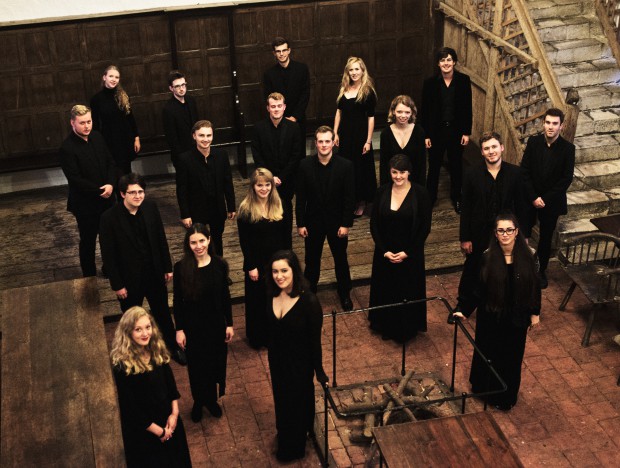Monday (21 September): to St John’s Smith Square for the opening night of the London International A Cappella Choir Competition, which happens to coincide with the 2,000th concert of the Tallis Scholars, broadcast live on the BBC. This is a coincidence, since when we planned the event a year ago it was far from hitting precisely that round number. The inevitable reshuffling of dates since then has come out in favour of veracity, not that anyone but me, the keeper of the database, would have known. Or cared, probably.
It is a big occasion which we made all the harder for ourselves by having to travel back that same day from a show the previous evening in Barcelona; and then choosing to sing a devil of a mass by Sheppard for the first time. I am too distracted to enjoy the music-making fully, twice suffering from the kind of mental incapacity that jetlag visits on people, this being a very brief but total gap in the flow of one’s concentration. The first was during the second ‘Hosanna’, when I couldn’t hear a new speed quickly enough, and the second at the end when I was making remarks that came out more impromptu-sounding than I had intended. No-one seemed to care about this either, the Sheppard stealing the show.
Tuesday: back to Smith Square to take part in a masterclass, hosted by Ghislaine Morgan. Ghislaine is the ideal vocal coach, able to describe in almost embarrassing detail where every sound we emit comes from in the body. I learn that if you want to sing high you put your chin down, and if you want to sing low you do the opposite. I find this counterintuitive and start coughing. The members of the Epiphoni Consort, however, take to it without a hitch, and eventually earn a place in the final run-off on the Saturday.
Wednesday: to St James’s Piccadilly for a lunchtime recital by the Templar Scholars who, in 50 minutes, perform music from Dufay to Gabriel Jackson, the featured composer of the week. They are young and so much more ambitious than I was at that age it makes my head spin. Their blurb says that they are named after the Knights Templar on account of hoping to emulate their ‘networking skills’. Almost every young group in the competition describes themselves as being either ‘dynamic’, ‘fresh’ or ‘innovative’, these adjectives rapidly losing all meaning.
Thursday: to St Stephen’s Rochester Row for a lunchtime recital by the Schola Cantorum of the Cardinal Vaughan Memorial School. This choir is all-male, including a team of boy trebles. To judge a choir that includes children against doughtier fare is an almost impossible task, since no one wants the boys to sound like adults, yet if they don’t they’ll be held to lack the requisite choral discipline. I enjoy their performance very much, fascinated by the extraordinary expressions the young come up with quite instinctively when singing.
In the evening we all repair to Smith Square for the first round of the heats. My fellow jurists include Gabriel Jackson, Ghislaine Morgan and Lionel Meunier, the director of a Belgian group called Vox Luminis, which won the Gramophone Record of the Year award in 2012. Lionel tells me his group is only the second early-music group ever to win this award, and the first was so long ago he can’t remember when it was. Nineteen eighty-seven, I tell him, with authority. This makes me feel very old-statesmanish, a role I am not used to.
Friday: to St Gabriel’s Pimlico, where I hear a piece of music that moves me to tears. This is a setting of the Lamentations by Rudolf Mauersberger, entitled ‘Wie liegt die Stadt so wüst’, written in the aftermath of the destruction of Dresden. Mauersberger was then conductor of the Dresdner Kreuzchor, the conflagration killing several of his boy choristers. Few renaissance settings of these famous words get quite so completely to the heart of the matter.
Again we repair to Smith Square for the evening’s entertainment. A group called the Gesualdo Six appears with five singers, which causes me to speculate on whether the missing person is a soprano Gesualdo has disposed of. Our summings-up are full of merry quips of this sort, and I come away wondering whether we have done our job as we should. This group and Sansara go through to the final.
Saturday: at the finals I get another chance to hear the Mauersberger, which Mark Williams, who is now sitting on the panel beside me and has a sense of pitch that can distinguish fractions of quarter-tones, tells me has started in F sharp and not the stipulated F. This leads to much discussion about whether it is permissible in modern music to choose one’s own pitch, as one can in renaissance music, the point being that in modern music these two keys are held to carry different emotional charges. On closer questioning we discover that the note-giver was so nervous he wobbled sharp and didn’t notice. We let that go; and Sansara win the audience prize and the competition.






Comments